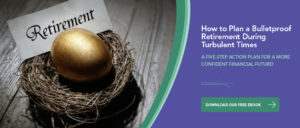Will the Economy Always Be Like This?
Without an adequate understanding of where their financial security stands in times like these, even high-net-worth investors sometimes feel as though stability is out of reach. However, with a firm grasp of economic trends and practices—and the insight for making informed investment decisions when times are tough—there is hope for a prosperous future.
The important thing now is to remember that we aren’t in a recession, not yet. It looks increasingly likely for the fourth quarter of the year or the start of 2024. In the meantime, however, we aren’t in one yet. With this in mind, let’s take a look at measures you can take to fortify your finances.
These topics are discussed in this article:
- Why is the U.S. probably headed into a recession?
- Recessions aren’t permanent, but they can linger
- You can still retire with confidence in Woodbridge
- Heritage Capital can help maintain your finances
Why Is the U.S. Probably Headed Into a Recession?
Despite what was hailed as a promising recovery in the aftermath of the COVID-19 pandemic’s economic effects, growth has been slow at times. Inflation could be one of a larger downturn’s primary ingredients. When the purchasing power of a currency decreases, the price of goods and services is driven increasingly higher.
Some economists break this down to the result of too much money in circulation: The greater the number of dollars that are passing around, the more common they are. As a result of supply and demand, this overabundance makes them less valuable. Next, because it takes more dollars to buy a good or service than it previously did, the dollar price of everything goes up.
This can be particularly devastating for people living paycheck to paycheck. Inflation may also lead to more interest rate hikes, which can make it more difficult for businesses to invest and grow. Raising interest rates may be inevitable, however, because they are the Federal Reserve’s most useful tool for slowing inflationary growth within the economy.
The U.S. government’s overspending is another major contributor. Both sides of the political aisle have been running massive budget deficits for years. Worse still, politicians have been borrowing trillions of dollars to finance their spending for years now. Some have argued, from time to time, that this could help boost the economy.
However, the long-term effects of these deficits are becoming increasingly evident to the contrary: Growing, unpaid deficits can lead to higher interest rates. These, in turn, tend to crowd out private investment, slowing economic growth to the point of recession.
Finally, the role of high taxes factors in, as well. Some argue that these costs help fund government programs, reducing income inequality. Nevertheless, they can also have a measurably negative impact on economic growth. Excessive taxation can lead to lower disposable income for consumers. This seldom ends in a soft landing for everyone.
Passersby having less money in their pockets inevitably leads to decreased spending and slower economic growth. It also tends to discourage businesses from investing and creating jobs, which can further slow the economy.
So, what can be done to turn things around?
Again, fortunately, we still have time to think and plan ahead as individuals. Unfortunately, there doesn’t seem to be a fast, easy answer for the U.S. in a recession. Long-term solutions might include reducing government overspending, finding ways to reduce the budget deficit, and reducing tax rates or simplifying the tax code.
These steps could help boost economic growth, making the U.S. more competitive on the global stage. However, this outcome is far from guaranteed.
If April Was Painful, Roth Conversions May Help Make Things Easier for Tax Season Next Year
Recessions Aren’t Permanent, but They Can Linger
Recessions are a normal part of the economic cycle. NBER, the National Bureau of Economic Research, describes a recession as “a significant decline in economic activity spread across the economy, lasting more than a few months, normally visible in real gross domestic product (GDP), real income, employment, industrial production, and wholesale-retail sales.”
The length of time for recessions in the United States varies widely. The NBER has recorded 33 business cycles since 1854, with the average length of a recession being 11 months. However, the most recent recession, which began with a downturn in the stock market in 2008, lasted for 18 months.
Again, the national debt of the United States was rising steadily for several years, even before the COVID-19 era accelerated the trend. By February of this year, it stood at $31.458 trillion. That’s roughly one trillion (a million times a million) more than in 2022. Until this trend changes, lasting economic improvement may be challenged.
Inflation could also continue reducing consumer purchasing power, slowing economic growth. To combat it, the Fed has raised interest rates at a historic pace. This often works, eventually, but it’s a process that must be timed with extreme care. As rising rates make it harder for them to secure loans, consumer spending can decline.
There may be something of a vicious cycle to rising inflation, which taxes get raised to account for, resulting in even less money in the pockets of consumers. Higher taxes, again, often reduce the incentive for businesses to invest and hire new employees. The higher unemployment rates that result tend to slow economic growth, as well.
You Can Still Retire With Confidence in Woodbridge
 High-net-worth retirement planning can be a daunting task, especially during times of economic uncertainty. Nevertheless, with comprehensive financial planning, even in the shadow of a future downturn, you can still plan for a comfortable exit from the workforce.
High-net-worth retirement planning can be a daunting task, especially during times of economic uncertainty. Nevertheless, with comprehensive financial planning, even in the shadow of a future downturn, you can still plan for a comfortable exit from the workforce.
With a recession on the horizon, it’s natural to feel anxious at times. However, panic selling your assets often leads to significant losses and regret. That’s where an objective wealth manager comes in. We can provide a clear and unbiased perspective on your investments, helping you stay focused on your long-term financial goals.
Some sectors will probably perform better than others. So, spreading your investments across various asset types, such as real estate and commodities, may be key to helping protect your portfolio from significant losses. You should review your asset allocation regularly, ensuring that it aligns with your risk tolerance and financial goals.
Tax planning is also extremely important for high-net-worth individuals. Tax loss harvesting, for example, involves selling underwhelming investments at a loss to offset gains elsewhere in your portfolio. Roth conversions, meanwhile, move funds from a traditional IRA or 401(k) into a Roth IRA, which can provide tax-free retirement income.
Heritage Capital Can Help Maintain Your Finances
The experienced team at Heritage Capital, LLC can make fortifying your retirement accounts against a recession’s impacts a pain-free (and possibly, profitable) long-term experience.
Contact us or schedule a consultation to learn more.


